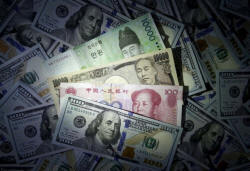|
Dollar jumps as concerns
ease on Trump presidency
 Send a link to a friend
Send a link to a friend
 [November 10, 2016]
By Yumna Mohamed [November 10, 2016]
By Yumna Mohamed
LONDON
(Reuters) - The dollar jumped to its highest level in two weeks and
continued to reverse brief initial losses from the surprise election of
businessman Donald Trump as U.S. president, as markets awaited more
clarity on his economic policy.
Trump's shock victory over Hillary Clinton initially triggered a massive
selloff in risk assets - sending the yen, euro and Swiss franc higher -
before turning around in volatile trade, helped in part by Trump's
acceptance speech which focused on unity and economic growth.
While markets still struggle for a clear narrative on what a Trump
presidency means for global growth, his concilliatory tone boosted
market expectations that the Federal Reserve will hike interest rates in
December and supported dollar strength.
"The dollar is taking back ground, particularly against the euro, since
yesterdayís election as market uncertainty was calmed by Trumpís more
presidential tone in his victory speech," Caxton FX analyst Alexandra
Russell-Oliver said.
The euro earlier hit a two-week low of $1.0890, near its lowest against
the greenback since Oct. 28 <EUR=D4>, currently sitting at $1.0900.

The dollar is now trading up a third of a percent on the day against a
basket of currencies at 98.841 <.DXY>, breaking past 106 Japanese yen -
a 4-month high - for the first time since July <JPY=>.
The Chinese yuan weakened past 6.80 per dollar in the offshore market on
Thursday for the first time in more than six years on fears that U.S.
president elect Donald Trump will act on the protectionist rhetoric that
ran through his campaign, particularly regarding trade with China. The
yuan weakened to 6.8225 against the dollar <CNH=>.
"For Asian currencies, the initial conclusions are somewhat negative,
given the trade dependency of the region, if not on the US, then on
China," HSBC strategist Paul Mackel said in a note.
The Australian dollar, hammered on Wednesday by concern over Trump's
protectionist promises and their fallout for China and others, was back
up over 1 percent against the greenback <AUD=D4>. That was helped by
better-than-expected after mortgage data but other analysts also pointed
to the potential for a boost in U.S. infrastructure spending, which
would drive more demand for the iron and other commodities Australia
produces.
[to top of second column] |

South Korean won, Chinese yuan and Japanese yen notes are seen on
U.S. 100 dollar notes in this file photo illustration shot December
15, 2015. REUTERS/Kim Hong-Ji//Illustration/File Photo

"Nobody really knows what he is going to do and we donít even have any
idea what his advisors are thinking," currency strategist Lutz Karpowitz
said.
"Markets are waiting to see if and how he will implement some of the
stranger ideas he spoke about during his election campaign. But he will
definitely implement some of those ideas which means that the current
dollar strength wonít be sustained."
Others see substantial reasons to expect more broad dollar strength next
year. Trump has promised tax reform which may draw more U.S. corporate
profits home and higher fiscal spending and growth is expected to spur
inflation and dollar interest rates higher.
The yield on benchmark 10-year Treasury debt fell back in Asian
trading to 1.995 percent, compared to its U.S. close of 2.064 percent on
Wednesday.
Prices fell on 10-year Treasury notes and 30-year bonds on Wednesday,
pushing yields to their highest levels in 10 months. [U/S]
(Editing by Andrew Heavens)
[© 2016 Thomson Reuters. All rights
reserved.] Copyright 2016 Reuters. All rights reserved. This material may not be published,
broadcast, rewritten or redistributed.
 |